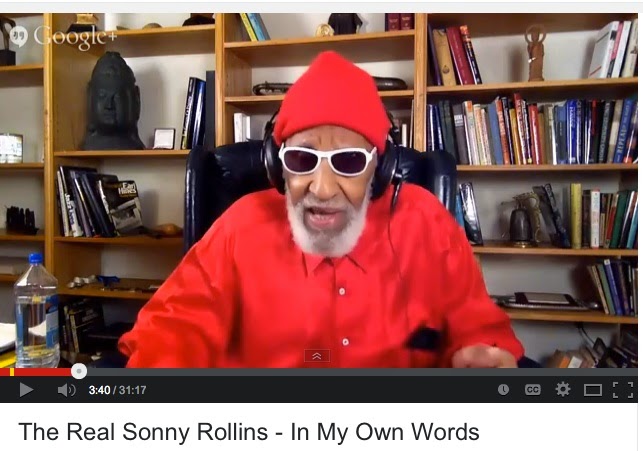8.7.14 BLEW NOTE
This article originally appeared in the 8.7.14 issue of Metroland.
Last week
some truly depressing quotes from the great jazz saxophonist Sonny Rollins started
popping up online. They were coming from
a New Yorker article entitled “Sonny
Rollins: In His Own Words.” The entire
article was a series of quotes, including:
Jazz might be the stupidest thing
anyone ever came up with. The band starts a song, but then everything falls
apart and the musicians just play whatever they want for as long they can stand
it.
I really don’t know why I keep doing
this. Inertia, I guess. Once you get stuck in a rut, it’s difficult to pull
yourself out, even if you hate every minute of it. Maybe I’m just a coward.
Some of my recordings are in the
Library of Congress. That’s idiotic. They ought to burn that building to the
ground. I hate music. I wasted my life.
None of
this remotely jibed with the little bit I knew about Sonny Rollins, which was
that he was a decent and spiritual man.
Pretty quickly I learned, by reading an angry blog post, that this was
supposed to be a humor piece, written
by someone calling himself “Django Gold”, who was described in his byline as a
senior writer for The Onion.
I guess
some people think this piece is funny.
But a lot more people thought it was for real, as the quotes continued
zinging through cyberspace, not as jokes, but as things Sonny Rollins actually
said. Monday Rollins did a 30-minute
live webcast from his home in Woodstock, which you can see now on YouTube and
which I highly recommend (search for “The Real Sonny Rollins”). He passionately and comprehensively defended
jazz, first pointing out that he was hurt over the fact that young jazz
musicians might read the piece and stop practicing. “The people who wrote this thing are trying
to kill jazz, but you can’t kill a spirit.”
He said he loved comedians Bob and Ray and that he subscribed to Mad Magazine. He quoted Churchill and Noam Chomsky. He was beautiful.
The New Yorker piece was a disgrace, and
“Django Gold” is a royal asshole. This
piece wouldn’t have run in The Onion,
because it truly isn’t funny. And they
can’t hide behind the claim that it’s satire.
It’s not. Satire is a literary
device by which someone’s weaknesses or
other bad qualities are exposed. This
didn’t do anything but attack Sonny Rollins and jazz. Exactly what “bad qualities” does Sonny
Rollins have that were “exposed” by the article? None! As
jazz-man Nicholas Payton said on his blog “it’s nerdy white-boy humor.” Except it’s not humor, but rather a putrid
character assassination that might make some immature hipster douchebags feel
good about themselves because they recognize references to Dexter Gordon, Miles
Davis, The 3 Deuces, and the Montreax Jazz Festival.
Sonny
Rollins could easily sue the bejesus out of the New Yorker and “Django Gold.”
And he should. He should sue to
punish them, and even more importantly to clear his name. Defamation consists of (a) the utterance or
publication of something about someone that’s not true; (b) the speaker’s
knowledge of the untruth; and (c) damage to the reputation of the subject. There’s a satire exception if the lies are so
outlandish that a “reasonable person” would conclude that they can’t be true. And that’s not the case here. It wasn’t for me, and it wasn’t for a ton of
people, including a lot of people who know a heck of a lot more than me about
jazz and Sonny Rollins. This was
defamation, pure and simple.
Contrast
this situation to our friends (and my clients) The Yes Men, who issue phony
press releases and impersonate governmental and corporate officials proclaiming
things like Dow Chemical is going spend a billion dollars cleaning up Bhopal,
or that the World Bank is shutting down because it realized it was harming
third-world countries. The corporations
and governments are then forced to deny these things, and often The Yes Men
issue phony denials first. The Yes
Men’s announcements are often reported as real news. Are these things defamatory? Technically maybe, but the effectiveness of
the stunts rely on people believing their outlandish claims, which then forces
the targets’ denials (like Dow Chemical having to state that it’s not going to clean up Bhopal). The end result is satire’s purpose, to expose
the truth. And it’s hard to argue that
the truth could harm a target’s reputation.
The fact is
that the Yes Men are pretty much insulated from lawsuits because of the
“Streisand Effect” – the notion that a lawsuit and the attendant publicity
would trumpet the Yes Men’s message and notoriety even more loudly, and embarrass
the target even more, no matter what the outcome of the lawsuit.
Which is
exactly why Sonny Rollins ought to sue: the Streisand Effect will work in his favor, as people reading about
the lawsuit will come to learn that he didn’t say what the New Yorker has him saying.
And people will also learn what hideous fuckheads “Django Gold” and the
editors at the New Yorker are.
Paul Rapp is a local
IP attorney who dangles participles as naturally as he breathes.


0 Comments:
Post a Comment
<< Home